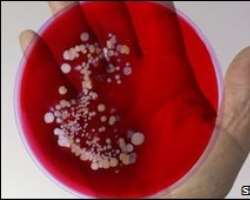GENETICS OF BODY GERMS REVEALED

Our hands alone carry hundreds of microbes
The entire DNA sequences of 178 microbes that live in, or on, the human body have been decoded.
Researchers want to understand how the vast array of bugs that share our skin, mouth, stomach and chest can cause disease.
A US consortium aims to crack the genomes of 900 bacteria and viruses.
The initial findings, reported in Science, will be used as a “reference library” to help put new sequences into context as they are unravelled.
The typical person is home to millions of microbes – the human gut alone is thought to contain at least 100 times more microbial genes than human ones.
These microbial cells outnumber our own cells by 10 to one, and they contain 100 times as many genes
Dr Julian Parkhill, Wellcome Trust Sanger Institute
Many flora on the human body have never been grown in the lab or identified.
Some are essential to us – playing a role in digesting food and developing the immune system.
And, while people are very similar to one another genetically, the colonies of microbes we host appear to differ from one person to the next.
The five-year project to map some of these microbes aims to find out which ones are present, the genes they have, and what they do.
Dr Sarah Highlander, of Baylor College of Medicine, Texas, and an author of the Science paper said: “The results show that we are choosing the right organisms to sequence and that they are representative of members of the human microbiome.”
Co-author Dr Karen Nelson of the US Venter Institute added: “We will continue to learn more about the impact of these species in health and disease conditions.”
Milestone
Commenting on the study, Dr Julian Parkhill of the Wellcome Trust Sanger Institute in Cambridge, said it was an important milestone.
“These microbial cells outnumber our own cells by 10 to one, and they contain 100 times as many genes.
“To study these microbes at a genetic level, and to understand these functions, we need to build a reference library of their genomes.
“This paper describes the start of that library, and is the first result of an international effort to build a comprehensive reference of these microbes.”
Professor Elaine Holmes of Imperial College London said the work, although far from complete, highlighted the fact that many of the microbial species residing in the human gut are still unknown.
She explained: “There is a rapidly growing realisation that microbes are responsible for many aspects of health and disease and that they exert influence far beyond the tissues in which they are localised.”
